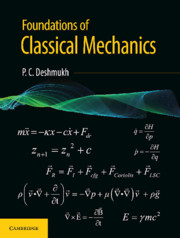Book contents
- Frontmatter
- Dedication
- Contents
- List of Figures
- List of Tables
- Foreword
- Preface
- Introduction
- 1 Laws of Mechanics and Symmetry Principles
- 2 Mathematical Preliminaries
- 3 Real Effects of Pseudo-forces: Description of Motion in Accelerated Frame of Reference
- 4 Small Oscillations and Wave Motion
- 5 Damped and Driven Oscillations; Resonances
- 6 The Variational Principle
- 7 Angular Momentum and Rigid Body Dynamics
- 8 The Gravitational Interaction in Newtonian Mechanics
- 9 Complex Behavior of Simple System
- 10 Gradient Operator, Methods of Fluid Mechanics, and Electrodynamics
- 11 Rudiments of Fluid Mechanics
- 12 Basic Principles of Electrodynamics
- 13 Introduction to the Special Theory of Relativity
- 14 A Glimpse of the General Theory of Relativity
- Index
Preface
Published online by Cambridge University Press: 06 November 2019
- Frontmatter
- Dedication
- Contents
- List of Figures
- List of Tables
- Foreword
- Preface
- Introduction
- 1 Laws of Mechanics and Symmetry Principles
- 2 Mathematical Preliminaries
- 3 Real Effects of Pseudo-forces: Description of Motion in Accelerated Frame of Reference
- 4 Small Oscillations and Wave Motion
- 5 Damped and Driven Oscillations; Resonances
- 6 The Variational Principle
- 7 Angular Momentum and Rigid Body Dynamics
- 8 The Gravitational Interaction in Newtonian Mechanics
- 9 Complex Behavior of Simple System
- 10 Gradient Operator, Methods of Fluid Mechanics, and Electrodynamics
- 11 Rudiments of Fluid Mechanics
- 12 Basic Principles of Electrodynamics
- 13 Introduction to the Special Theory of Relativity
- 14 A Glimpse of the General Theory of Relativity
- Index
Summary
It gives me great pleasure in presenting Foundations of Classical Mechanics (FoCM) to the undergraduate students of the sciences and engineering.
A compelling urge to comprehend our surroundings triggered inquisitiveness in man even in ancient times. Rational thought leading to credible science is, however, only about two thousand years old. Science must be considered young, bearing in mind the age of the homo sapiens on the planet Earth. Over two millennia, extricating science from the dogmas and superstitious beliefs of the earlier periods has been an inspiring struggle; a battle lamentably not over as yet. Progress in science has nonetheless been rapid in the last few hundred years, especially since the fifteenth and the sixteenth century.
To be considered classical, just as for the arts or literature, a scientific formalism needs to have weathered the tests of acceptability by the learned over centuries, not just decades. The work of Nicolas Copernicus (1473–1543), Tycho Brahe (1546–1601), and Johannes Kepler (1571–1630) in the fifteenth, sixteenth, and seventeenth centuries was quickly followed, in the seventeenth through the nineteenth centuries, by a galaxy of stalwarts, many of whom excelled in both experimental and theoretical sciences, and some among them were proficient also in engineering and technology. They developed a large number of specialized fields, including of course physics and mathematics, and also chemistry and life sciences. Among the brilliant contributions of numerous researchers who belong to this period, the influence of the works of Galileo Galilei (1564–1642), Isaac Newton (1642–1727), Leonhard Euler (1707–1783), Joseph Lagrange (1736–1813), Charles Coulomb (1736–1813), Thomas Young (1773–1829), Joseph Fourier (1768–1830), Carl Friedrich Gauss (1777–1855), Andre-Marie Ampere (1775–1836), Michael Faraday (1791–1867), William Hamilton (1805–1865), and James Clerk Maxwell (1831–1879) resulted in a lasting impact which has withstood the test of time for a few hundred years already. Their contributions are recognized as classical physics, or classical mechanics. The theory of relativity, developed later by Albert Einstein (1879–1955), is a natural fallout of Maxwell's formalism of the laws of electrodynamics, and is largely considered to be an intrinsic part of classical physics. The theory of chaos is also an integral part of it, though it is a little bit younger.
- Type
- Chapter
- Information
- Foundations of Classical Mechanics , pp. xxvii - xxxPublisher: Cambridge University PressPrint publication year: 2019



